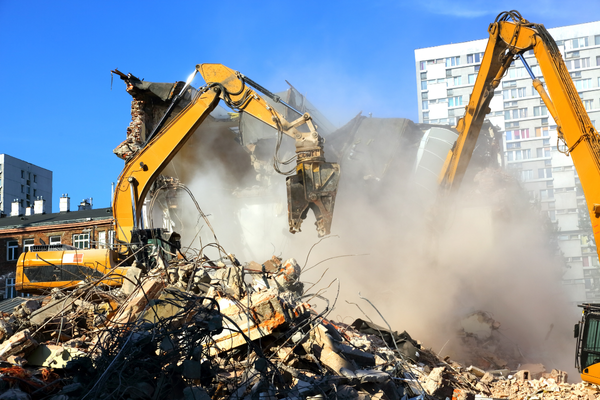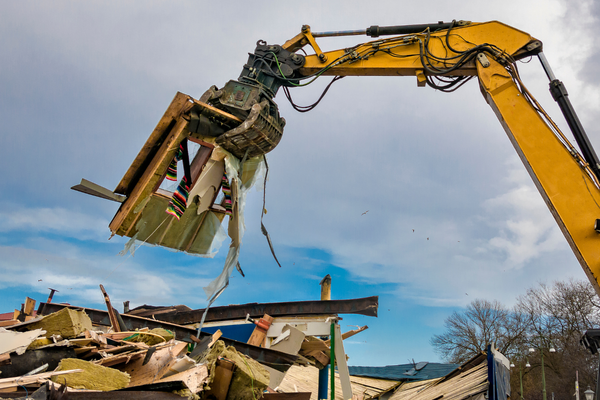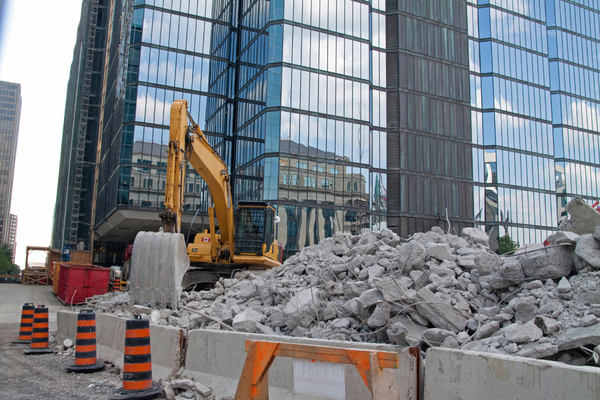Industrial Demolition in Charleston, SC
Charleston’s industrial landscape tells the story of economic evolution, where aging manufacturing facilities, chemical plants, and processing complexes require specialized industrial demolition services to make way for modern development. The complexity of dismantling heavy industrial structures demands contractors who understand sophisticated building systems, environmental regulations, and safety protocols that extend far beyond conventional demolition work. Industrial facility owners across the Charleston region face unique challenges when retiring production facilities that contain specialized equipment, hazardous materials, and complex utility systems.
Specialized Industrial Demolition Services Across Charleston's Manufacturing Districts
Industrial demolition contractors in Charleston handle projects that range from small manufacturing facility demolition to massive petrochemical complex removals. Each industrial demolition project presents unique engineering challenges that require specialized knowledge of industrial building systems, environmental compliance requirements, and safety protocols specific to heavy industrial operations.
Charleston’s port facilities and chemical manufacturing corridor create additional considerations for industrial demolition companies. Proximity to waterways affects environmental protection requirements, while active industrial operations nearby demand careful coordination to prevent disruption of ongoing production activities. Railroad connections, pipeline systems, and specialized utility infrastructure also influence demolition approaches for industrial complex demolition projects.
Primary Industrial Demolition Categories:
- Manufacturing facility demolition – Production plants, assembly facilities, and processing centers
- Factory demolition – Traditional manufacturing buildings and equipment removal
- Plant demolition – Chemical processing facilities, power generation stations, and refineries
- Heavy industrial demolition – Steel mills, foundries, and heavy equipment manufacturing
- Production facility demolition – Food processing, textile manufacturing, and specialty production
- Industrial building demolition – Warehouses, maintenance facilities, and support structures
TSIAC International approaches each industrial demolition project with extensive pre-planning that identifies specialized equipment, environmental hazards, and structural challenges before work begins. This thorough preparation prevents accidents, minimizes environmental impact, and maintains safety standards throughout complex industrial facility removal operations.


What Charleston Industrial Facility Owners Need to Know About Heavy Equipment Removal
Plant demolition in Charleston involves much more than dismantling buildings – industrial sites contain specialized machinery, process equipment, and utility systems that require expert knowledge for safe removal. Professional industrial demolition services must address environmental contamination, hazardous material abatement, and regulatory compliance requirements that don’t exist in conventional demolition projects.
Specialized Industrial Equipment Removal:
- Industrial equipment demolition – Manufacturing machinery, processing equipment, and production lines
- Machinery removal demolition – Heavy equipment extraction and transportation logistics
- Process equipment demolition – Specialized industrial systems and custom manufacturing equipment
- Pipeline demolition – Process piping, steam lines, and chemical transfer systems
- Conveyor system demolition – Material handling equipment and automated systems
Large-Scale Infrastructure Components:
Industrial complex demolition often involves massive structural elements that require specialized removal techniques:
- Tank demolition – Storage vessels, process tanks, and containment systems
- Silo demolition – Grain storage, chemical storage, and material handling towers
- Cooling tower demolition – Power plant cooling systems and industrial heat exchangers
- Steam system demolition – Boilers, piping, and distribution networks
- Power system demolition – Electrical distribution, transformers, and control systems
Environmental and Contamination Challenges:
Charleston industrial sites often contain environmental contamination that affects demolition approaches. Contaminated site demolition requires coordination with environmental consultants who assess soil conditions, groundwater impacts, and air quality concerns throughout the removal process.
Hazardous material demolition procedures address asbestos insulation, lead paint, chemical residues, and other dangerous substances commonly found in older industrial facilities. Professional contractors coordinate asbestos removal and testing and lead abatement services to meet strict regulatory requirements.
Toxic waste site demolition and chemical contamination demolition require specialized training, equipment, and disposal procedures that standard demolition contractors cannot provide. Environmental industrial demolition teams follow protocols established by state and federal environmental agencies throughout the removal process.
Why Choose TSIAC International?
TSIAC International brings more than 15 years of experience to Charleston industrial demolition projects, combining heavy industrial expertise with local knowledge of regulatory requirements and environmental conditions. This extensive background includes successful completion of manufacturing plant closures, chemical facility decommissioning, and power plant dismantling projects throughout the Southeast region.
Advanced Industrial Planning and Engineering:
Successful industrial equipment demolition begins with engineering assessments that identify structural loads, utility connections, and environmental hazards before removal work commences. TSIAC International conducts:
- Structural evaluations of industrial buildings and equipment foundations
- Process system mapping to identify utility connections and chemical residues
- Environmental assessments for soil contamination and groundwater impacts
- Safety planning that addresses industrial hazards and emergency response procedures
- Regulatory coordination with environmental agencies and industrial safety officials
Specialized Heavy Industrial Equipment:
Industrial demolition services require equipment specifically designed for heavy industrial applications. TSIAC International maintains specialized machinery including:
- Heavy-duty excavators – Extended reach capabilities for tall industrial structures
- Industrial cutting equipment – Plasma torches, hydraulic shears, and diamond wire saws
- Material handling machinery – Cranes, rigging equipment, and transportation systems
- Environmental protection equipment – Containment systems, air monitoring, and dust control
- Decontamination systems – Chemical washing, steam cleaning, and waste treatment equipment

Regulatory Compliance and Environmental Expertise:
Charleston industrial demolition projects require coordination with multiple regulatory agencies including EPA, OSHA, and South Carolina Department of Health and Environmental Control. TSIAC International maintains certifications for hazardous material handling and follows strict protocols for environmental protection during industrial facility removal.
Radiation decontamination demolition and specialized waste handling require additional certifications and equipment that standard demolition contractors don’t possess. Professional industrial demolition companies coordinate with environmental specialists and regulatory officials throughout complex removal projects.
How Production Facility Demolition and Utility Disconnection Work
Production facility demolition involves coordinated sequences that systematically shut down industrial processes while safely removing specialized equipment and building systems. Charleston’s industrial facilities often contain complex utility networks that require careful isolation and removal procedures.
Industrial Utility Disconnection Procedures:
Professional industrial utility disconnection follows established protocols that prevent accidents while maintaining service to surrounding facilities:
- Power system demolition – High-voltage electrical disconnection and transformer removal
- Steam system demolition – Boiler shutdown, pipe isolation, and equipment removal
- Compressed air system demolition – Compressor decommissioning and distribution system removal
- Gas line demolition – Natural gas, process gas, and specialty gas system isolation
- Water system demolition – Process water, cooling water, and fire protection system removal
Coordinated Equipment Removal Sequences:
Heavy industrial demolition requires careful sequencing that prevents structural collapse while allowing safe equipment extraction. Professional contractors coordinate crane operations, rigging procedures, and transportation logistics to remove massive industrial equipment without damaging surrounding structures.
Factory demolition projects often involve equipment that weighs hundreds of tons and requires specialized transportation methods. TSIAC International coordinates with heavy haul contractors, railroad companies, and port facilities to move industrial equipment from demolition sites to processing or disposal facilities.
Foundation and Below-Grade Work:
Industrial building demolition often reveals extensive underground infrastructure including process piping, electrical conduits, and foundation systems that require specialized removal techniques. Charleston’s coastal soil conditions and high water table create additional challenges for industrial foundation removal and site restoration.
Crawl space work and underground utility removal in industrial settings require specialized techniques that account for chemical contamination and structural complexity. Professional contractors coordinate with geotechnical engineers to develop appropriate methods for below-grade industrial demolition work.
Common Questions About Charleston Industrial Demolition Services
How long do manufacturing facility demolition projects typically take?
Industrial demolition services timelines vary dramatically based on facility size, equipment complexity, and environmental conditions. Simple manufacturing facility demolition might require 4-8 weeks, while major petrochemical plant demolition can take 6-18 months. Environmental remediation needs, equipment removal complexity, and regulatory approval processes significantly affect project schedules. Charleston’s hurricane season and port activity may also influence timing for large industrial projects. TSIAC International provides detailed schedule estimates during initial assessments and maintains regular communication about progress throughout industrial complex demolition projects.
What environmental permits are required for contaminated site demolition?
Environmental industrial demolition requires multiple permits and regulatory approvals depending on contamination type and facility operations history. Air quality permits may be needed for dust control and chemical emissions, while water discharge permits address runoff and decontamination activities. Hazardous waste manifests are required for contaminated materials, and soil remediation permits may be necessary for ground contamination. TSIAC International coordinates with environmental consultants and regulatory agencies to obtain all required approvals while maintaining compliance throughout toxic waste site demolition projects.
How do contractors safely handle asbestos industrial demolition and chemical contamination?
Asbestos industrial demolition requires specialized training, equipment, and containment procedures that protect workers and surrounding communities from fiber exposure. Professional contractors conduct pre-demolition surveys, develop abatement plans, and use negative pressure containment systems during removal work. Chemical contamination demolition involves similar protocols with additional safety measures for specific chemical hazards. TSIAC International maintains certifications for hazardous material handling and coordinates with environmental specialists for complex contamination issues throughout heavy industrial demolition projects.
Professional Industrial Demolition Companies You Can Trust
Charleston industrial facility owners deserve demolition services that prioritize safety, environmental protection, and operational efficiency while preparing sites for future development. The industrial demolition process affects not just the immediate work area but surrounding industrial operations, environmental conditions, and community safety.
Successful heavy industrial demolition projects require coordination between multiple specialists including structural engineers, environmental consultants, equipment riggers, and transportation companies. TSIAC International manages these complex relationships to maintain project schedules and safety standards throughout industrial equipment demolition work.
Industrial facility owners often underestimate the complexity of plant demolition until projects begin. Hidden utilities, unexpected contamination, and equipment removal challenges can derail unprepared contractors and create expensive delays. Experienced professionals anticipate these complications and develop contingency plans that keep projects moving forward safely and efficiently.
The difference between amateur and professional industrial demolition becomes apparent in project outcomes. Professional contractors leave clean, environmentally compliant sites ready for immediate redevelopment, while inexperienced teams often create additional problems that increase overall project costs and regulatory complications.
Pipeline demolition and utility system removal often require coordination with multiple utility providers and regulatory agencies who have jurisdiction over industrial infrastructure. Professional contractors understand these requirements and maintain positive relationships with regulatory officials throughout the demolition process.
Industrial site preparation often involves concrete grinding and crushing services that recycle foundation materials and hardscape elements from demolished facilities. This integrated approach reduces disposal costs while providing recycled materials for new construction projects.
Don’t risk your Charleston industrial facility with inexperienced demolition contractors who lack the specialized knowledge and equipment needed for safe heavy industrial work. TSIAC International combines technical expertise, environmental compliance, and genuine commitment to safety to deliver superior industrial demolition results.
Charleston’s industrial future depends on safe, efficient facility transitions that protect environmental quality while supporting economic development. Professional industrial demolition services provide the expertise needed to achieve these goals while meeting the complex requirements of heavy industrial facility removal.
Contact TSIAC International today to discuss your industrial demolition needs and discover how specialized contractors can safely remove your facility while preparing your site for future industrial development success.